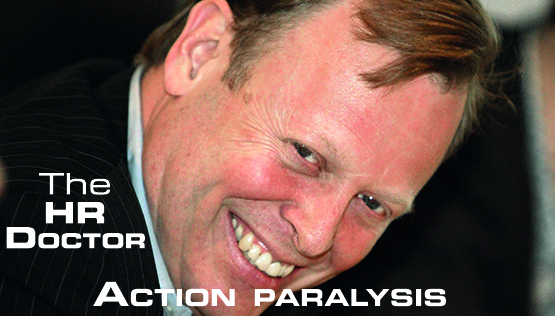 03.09.2020
03.09.2020
The HR Doctor 9: Action paralysis
Af Nick Holley, Associate Director of Learning, Corporate Research Forum
|
Nick Holley er Keynote på Træfpunkt HR 2020 online, hvor han deler ud af sine diagnoser over de 10 ”sygdomme”, som han har set HR lide af i de 30 år, han har fungeret som praktiker, researcher, underviser og konsulent. Kan du genkende dem? Som optakt til Keynoten sætter vi fokus på de 10 sygdomme i ugerne op til Træfpunkt HR. |
When I googled HR conference I got 625,000,000 results! Conferences are great to be challenged, to force us to ask the right question, to network, to listen to deep experts, but I would question people who go to them looking for answers, looking for best practice that they can apply in their own organisation. Just because something works in one company doenn’t mean it necessarily work in others. This is one example of action paralysis. Doing something, in this case irrelevant benchmarking, that we feel is value added, that gives us a feeling we are making progress, that gives us comfort we are doing something. Instead we need to focus on doing fewer things, better.
Symptoms
- HR thinks it is doing lots of things, that it’s busy, busy, busy, but actually it is seduced by the appearance of activity when it isn’t actually taking action to address its issues. Examples of this include:
- Overemphasis on consensus - HR spends all its time managing stakeholders and searching for consensus by which time it’s too late.
- Over complication - gold plating everything rather than creating solutions that are fit for purpose.
- Perfectionism - trying to find the perfect solution so never getting around to actually doing anything.
- Irrelevant benchmarking - constantly hunting for best practice without recognising the context or the practicalities. Best practice irrelevant of context is irrelevant.
- Overemphasis on consensus - HR spends all its time managing stakeholders and searching for consensus by which time it’s too late.
- As with so many of these diseases action paralysis can be caused by overdoing something good. Analysing the data and stepping back to understand the context and the situation is great as it focuses you on doing the things that address the root cause of the situation. Spending your whole time analysing and never coming to a conclusion, results in the related disease of ‘analysis paralysis’.
Impact
The impact is really simple: HR never delivers anything of value because it’s too tied up with running around and around chasing its own tail. For a while people are impressed by this seeming hive of activity, but, as the underlying problems get worse and worse eventually someone with power notices and outsources HR.
Example
I worked with one business whose moto was ‘world class in everything we do’. This was fine in the business where they delivered high quality products in a highly competitive market, it was their source of differentiation. The problem was HR had adopted it as a value. As a result, everything they did was world class, which meant over engineered and over complex. They had to make a shift in thinking to good enough is good enough.
Cures
- HR people should learn about Pareto analysis. Pareto, an Italian mathematician showed that 20% of what we do has 80% of the desired impact. HR needs to learn where to focus, when good enough is good enough.
- HR needs to learn to ‘hold a strong opinion weakly’. This means doing enough analysis to form a robust opinion but then beginning to move. The ‘only outcome you won’t get is the one you expect’, so it is critical to pilot things and learn from them; changing your opinion to reflect new data and realities. The danger with over analysis is you take too long to form an opinion but then won’t change it to fit an emergent and unexpected reality.
- The military have a saying: ‘No strategy survives contact with the enemy’. They plan but they recognise they need to implement the plan quickly so they can learn. In HR we need to understand that no plan survives contact with reality. This means planning the detail as close to reality as possible (usually this isn’t at group head office) and only planning the detail up to the point where you get the first feedback on what is actually happening. By letting go of the urge to control by planning detail in advance HR can have greater control by responding flexibly to what is actually happening.
- Business is moving ever faster so HR has to learn to move at the speed the business is moving at. This means prioritising, focusing time on the vital few and focusing on making things simple enough though no simpler.
Læs også
- The HR Doctor 1: Disconnection disorder
- The HR Doctor 2: Delivery deficiency
- The HR Doctor 3: Initiativitis
- The HR Doctor 4: Compartmentalisation
- The HR Doctor 5: Dominance Pathology
- The HR Doctor 6: Easy Way Outosis
- The HR Doctor 7: Lack of depth malady
- The HR Doctor 8: Me-me-me syndrome
- The HR Doctor 10: Hair shirtysm